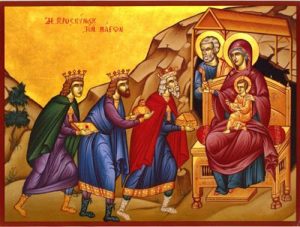Mount Calvary Church
Rev. Albert Scharbach, Pastor
A Roman Catholic Parish
Anglican Use
The Personal Ordinariate of the Chair of S. Peter
Eutaw Street and Madison Avenue
Baltimore, Maryland
January 6, 2019
The Epiphany of Our Lord and Saviour Jesus Christ
10:00 AM
Sung Mass
____________________
The Proclamation of the Date of Easter and of the Moveable Feasts
In keeping with the ancient practice of the Church, at this time is announced:
Know, dear brethren, that, as we have rejoiced at the Nativity of Our Lord Jesus Christ, so by leave of God’s mercy we announce to you also the joy of his Resurrection, who is our Savior.
On the sixth day of March will fall Ash Wednesday,
and the beginning of the fast of the most sacred Lenten season.
On the twenty-first day of April you will celebrate with joy Easter Day, the Paschal feast of our Lord Jesus Christ.
On the thirtieth day of May will be the Ascension of our Lord Jesus Christ.
On the ninth day of June, the feast of Pentecost.
On the sixteenth day of June, the feast of the Most Holy Body and Blood of Christ.
One the first day of December, the First Sunday of the Advent of our Lord Jesus Christ, to whom is honor and glory for ever and ever. Amen.
Common
Anglican Folk Mass, Martin Shaw
____________________
Anthems
William Byrd (1540-1623)
Reges Tharsis et insulae munera offerent,
reges Arabum et Saba dona adducent.
Et adorabunt eum omnes reges terrae,
omnes gentes servient ei.
The kings of Tharsis and the isles offer their gifts,
the kings of Arabia and Sheba bring gifts.
And all the kings of the earth worship him,
all peoples bow before him.
__________
Christina Rossetti (1830-1894) / Harold Darke (1888-1976)
In the bleak midwinter,
frosty wind made moan.
Earth stood hard as iron,
water like a stone.
Snow had fallen,
snow on snow,
snow on snow,
in the bleak midwinter
long ago.
Our God,
heaven cannot hold Him,
nor earth sustain;
heaven and earth
shall flee away
when he comes to reign.
In the bleak midwinter,
a stable place sufficed
the Lord God Almighty,
Jesus Christ.
Enough for Him,
whom cherubim
worship night and day,
a breast full of milk
and a manger full of hay.
Enough for him,
whom angels
fall down before,
the ox and ass and camel
which adore.
What can I give Him,
poor as I am?
If I were a shepherd,
I would bring a lamb.
If I were a wise man,
I would do my part.
Yet what I can I give Him,
give my heart.
The Choir of King’s College, Cambridge
__________________
Hymns
As with gladness men of old (DIX) is by William Catterton Dix (1837–1898). The particular strength of the hymn is the way in which in each of the first three verses the narrative of the visit of the wise men is related to the present day in the final couplet, opening with the word ‘So’. The themes of travel and of light are continued in the last two verses, which deal with the journey through life towards the heavenly kingdom.
What star is this (PUER NOBIS) is a translation by John Chandler (1806–1876) of the hymn by Charles Coffin, Quae stella sole pulchrior, from the Paris Breviary (1736). The hymn is a prayer for God’s presence in our lives as we draw closer to Him. The Magi showed faith in God and eagerness, as well as sacrifice, in their journey to see the Christ-child. So may we live as though we really believe and eagerly look forward to the day when we shall one day see Him. In the third stanza, the gifts of the Magi are not even named. The Magi took the trouble to bring “gifts most rare” on a long journey. So may we “All our costliest treasures bring, Christ, to Thee, our heavenly King.” This pilgrimage is not easy, so we sing, “Holy Jesus, every day keep us in the narrow way,” remembering that Jesus said, “For the gate is narrow and the way is hard that leads to life, and those who find it are few” (Matthew 7:14).
Songs of thankfulness and praise (SALZBURG) was written by Christopher Wordsworth (1807–1885), who described it as “recapitulation of the successive manifestations of Christ…and anticipation of that future great and glorious Epiphany, at which Christ will be manifest to all, when He will appear again to judge the world.” The stanza “Sun and moon shall darkened be” is omitted in the 1940 Hymnal. In many of the hymns of Advent and Christmas, references to the Second Coming, with its wonders and terrors, are usually toned down or omitted, but we do not so much look to the past as to the future, awaiting the Final Coming of our King, the desire of all nations and the fulfillment of all wisdom.
